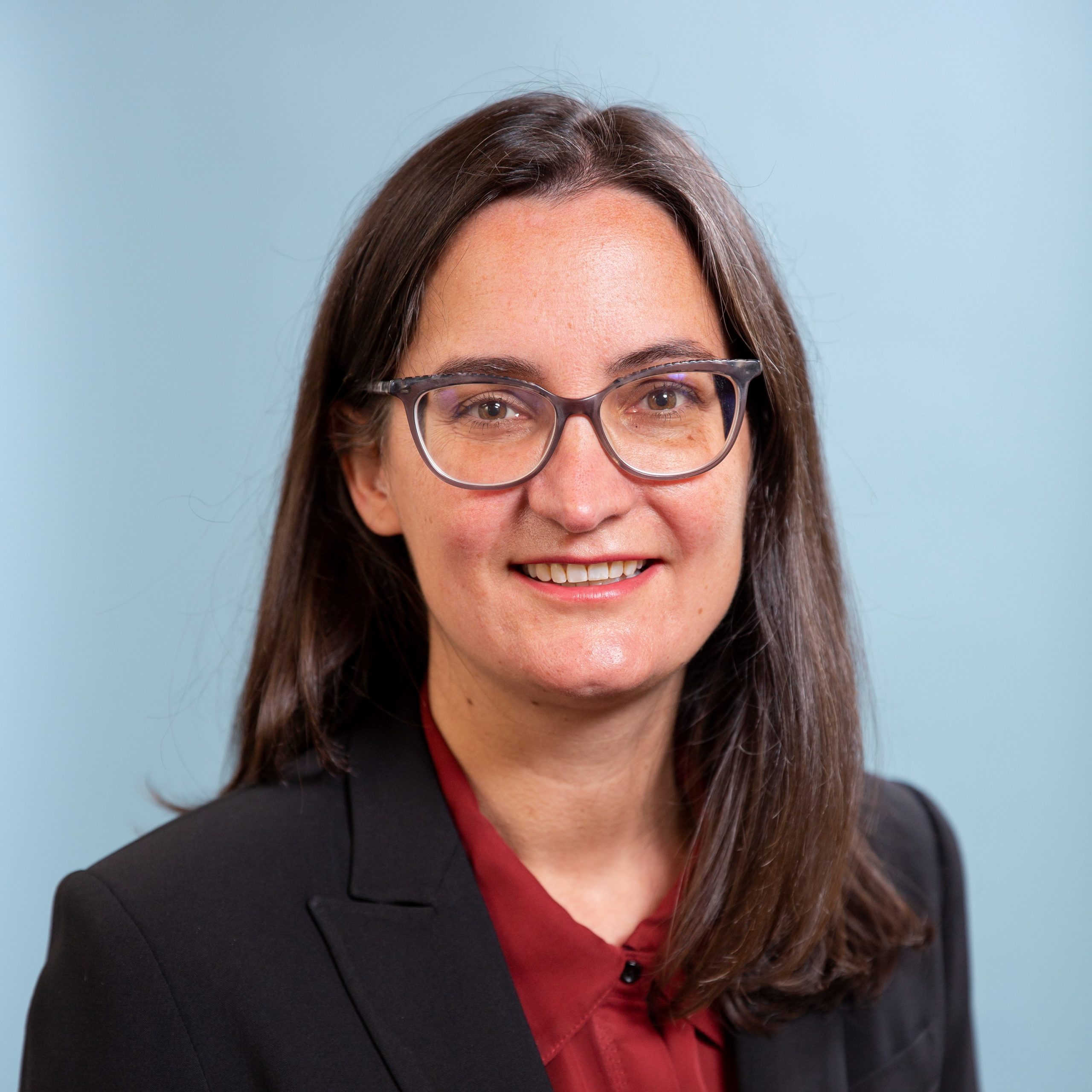Catherine Crump is director of the Samuelson Law, Technology & Public Policy Clinic at UC Berkeley School of Law, as well as Clinical Professor of Law. Crump’s civil liberties advocacy focuses on protecting privacy and free speech in an era of increasingly ubiquitous surveillance. She also focuses on ensuring that new technologies are integrated into the criminal legal system with attention to equity and accuracy.
Under Crump’s leadership, the Samuelson Clinic has litigated cases to force disclosure of records regarding the Trump Administration’s use of social media information to remove or exclude people from the United States based on their expression or beliefs; to improve public access to court records about the government’s use of electronic surveillance; and to push back against court orders requiring websites to remove content. She has also authored or co-authored reports on the use of electronic monitoring technology on youth in the juvenile system; why courts should impose consequences when police officers fail to activate their body-worn cameras and then want to testify about unrecorded events; and on a Federal Bureau of Prisons policy of monitoring emails that incarcerated persons send to their attorneys. Crump has testified before Congress, the European Parliament, and various state legislatures and municipal bodies on issues including cell phone location tracking and the impact of national security surveillance on people outside the United States.
Crump appears regularly in the national news media as an expert commentator as well as opinion writer, in outlets such as The Washington Post, The Los Angeles Times and CNN. Her TED talk on the civil liberties problems with automatic license plate readers has been viewed some 2 million times.
Crump’s scholarly agenda addresses regulation of surveillance technology, particularly by state and local government. Her piece Surveillance Policy Making By Procurement documented the ways in which federal grants for surveillance technology subvert local democratic control of policing. Another article, Tracking the Trackers, focused on the use of location tracking bracelets on youth going through the juvenile system. It demonstrated the ubiquitous nature of this technology and documented its net-widening effect.
Prior to joining the Berkeley Law faculty, Crump spent nearly nine years as an attorney at the American Civil Liberties Union, where she litigated First and Fourth Amendment challenges to national security-related policies as well as police surveillance. She filed and argued some of the first civil lawsuits against the government’s policy of conducting suspicionless searches of electronic devices at the international border, argued before the en banc Third Circuit in a case challenging the government’s warrantless use of a GPS tracker on a vehicle, and was counsel in a landmark free speech case challenging the Child Online Protection Act. She also authored two influential reports, You Are Being Tracked: How License Plate Readers Are Being Used to Record Americans’ Movements and (with co-author Jay Stanley) Protecting Privacy from Aerial Surveillance: Recommendations for Government Use of Drone Aircraft.
Crump is a graduate of Stanford University and Stanford Law School. In 2014 the law school awarded her the Miles L. Rubin Public Interest Award, given annually to one graduate who has made an outstanding contribution to the public interest. She clerked for Judge M. Margaret McKeown of the United States Court of Appeals for the Ninth Circuit.
Education
B.A., Stanford University (2000)
J.D., Stanford Law School (2004)
Catherine Crump is teaching the following courses in Spring 2024:
• 285.9 sec. 001 - Samuelson Clinic Seminar
• 295.5T sec. 001 - Samuelson Clinic
• 295.5U sec. 001 - Advanced Samuelson Clinic
Courses During Other Semesters
| Semester | Course Num | Course Title |  Teaching Evaluations Teaching Evaluations | Fall 2024 | 285.9 sec. 001 | Samuelson Clinic Seminar | 285.9B sec. 001 | Advanced Samuelson Clinic Seminar | 295.5T sec. 001 | Samuelson Clinic | 295.5U sec. 001 | Advanced Samuelson Clinic | Fall 2023 | 285.9 sec. 001 | Samuelson Clinic Seminar | View Teaching Evaluation | 295.5T sec. 001 | Samuelson Clinic | View Teaching Evaluation | 295.5U sec. 001 | Advanced Samuelson Clinic | View Teaching Evaluation |
|---|
Greatest Hits: A Dozen Stories From 2023 That Reflect Berkeley Law’s Impact
From helping to write a tribe’s constitution to providing free training worldwide on digital investigations of human rights violations to propelling crypto industry reform, the school had quite a year.
An abused wife took on Tesla over tracking tech. She lost.
“Stalkers always find a way to use location data, making this problem “totally foreseeable,” said Catherine Crump, a Berkeley Law School professor specializing in privacy issues involving technology. “It is disappointing that a company as sophisticated and well-resourced as Tesla doesn’t have better answers to this,” said Crump, who is also a former adviser to the White House Domestic Policy Council.
Two Professors Start Tech-Related White House Appointments to Help Shape U.S. Policy
Privacy experts Catherine Crump and Rebecca Wexler take on key posts with the White House Domestic Policy Council and White House Office of Science Technology Policy, respectively.
Standing Firm: How Berkeley Law Faculty and Students are Stepping Up to Advance and Defend Basic Rights
With basic rights in peril at home and around the world, the law school community is answering the call.
Abortion Is Illegal for Millions. Will Big Tech Help Prosecute It?
“We live our lives online, we leave digital breadcrumbs of our prior activities, and of course those are going to be caught up in abortion investigations,” says Professor Catherine Crump, director of the Samuelson Law, Technology and Public Policy Clinic. Tech companies will almost certainly comply with state law and hand over information from legal court orders, but they should be transparent with their users and the public when they do and disclose how many abortion-related court orders they get, she adds.
Cellphone Data Collection, Tracking Apps Can Help States Prosecute Women Seeking Abortions
“If you have a period tracking app, you should delete it,” says Professor Catherine Crump, director of the Samuelson Law, Technology & Policy Clinic. “Tech companies like everyone else has to comply with law and they may not have a choice about what data they collect, what data they are forced to disclose. The law enforcement agency gets a warrant and serves it on Google and asks for location information and it’s a valid warrant. Google is going to have a hard time not complying with that.”
North Star: Student Calls for More Access to Surveillance Requests in Minnesota Federal Court
Samuelson Clinic student Jennifer Sun ’23 and supervising attorney Megan Graham argue for more public access to surveillance records requests in Minnesota federal court.
Immigrant groups sue ICE for information on alternative detention programs
Professor Catherine Crump, Director of the Samuelson Law, Technology & Public Policy Clinic, filed suit on behalf of a coalition of immigrant rights groups seeking information from Immigrations and Customs Enforcement about the agency’s Intensive Supervision Appearance Program, a so- called alternative to detention program that has ballooned during the Biden administration
How CNN, The New York Times and Other Major Media Outlets Monetize Your Data and Lobby Against Regulation
Professor Catherine Crump, Director of the Samuelson Law, Technology & Public Policy Clinic, notes the ACLU’s decision to use tracking technology was made by the ACLU’s fundraising and advocacy team, not its legal department, which often does not work in tandem
Agencies Seek Reversal in FOIA Suit Over Trump Administration Vetting at US Border
Professor Catherine Crump, Director of the Samuelson Law, Technology & Public Policy Clinic, arguing before the Second Circuit on behalf of the plaintiffs in Knight First Amendment Institute v. United States Citizenship and Immigration Services, said that the Trump Administration’s alleged “ideological screening” of immigrants and refugees at the border included questions that were too widely asked and general
Teaching Tech: Berkeley Law Clinic Arms Public Defenders with Digital Tools
The Samuelson Clinic’s Megan Graham has trained more than 1,000 public defenders in three years on how to litigate cutting-edge technology issues.
Oakland police give FBI “unfettered access” to license plate reader data, according to lawsuit
Professor Catherine Crump, Director of the Samuelson Law, Technology & Public Policy Clinic, discusses a lawsuit filed by a member of the city’s privacy advisory commission accusing police of violating multiple city and state laws
From Harvard to Berkeley, Clinics Train Next-Gen Tech Lawyers
Professor Catherine Crump, Director of the Samuelson Law, Technology & Public Policy Clinic, discusses the clinic’s work and the beneficial experience of clinic work for students, whether their goals are to work in public interest or the private sector
Is there any way out of Clearview’s facial recognition database?
Professor Catherine Crump, Director of the Samuelson Law, Technology & Public Policy Clinic, says facial recognition technology and analytics generally have been revolutionary because they’ve put an end to privacy by obscurity
When It Comes To Email, Some Prisoners Say Attorney-Client Privilege Has Been Erased
Professor Catherine Crump, Director of the Samuelson Law, Technology & Public Policy Clinic, discusses the clinic’s work to stop the federal Bureau of Prisons from reading emails incarcerated persons send to their attorneys
Clinical Professor Jennifer Urban ’00 to Chair New California Privacy Protection Agency
A longtime leader in Berkeley Law’s tech-law clinic and center, Urban will help the innovative agency protect consumers’ privacy rights over their personal information.
As a New Administration Dawns, Berkeley Law Professors Propose How to Tame Privacy Inequalities
Professors Catherine Crump and Rebecca Wexler translate some of their scholarly work on electronic evidence and surveillance technology into policy guides.
Response To Capitol Riot Could Hurt Minorities, Civil Libertarians Say
Professor Catherine Crump, Director of the Samuelson Law, Technology & Public Policy Clinic, says law enforcement should not use facial recognition technology widely until racial disparities are fixed
Op-Ed: Lawyers can’t visit clients in prison, so quit monitoring their emails
Professor Catherine Crump, Director of the Samuelson Law, Technology & Public Policy Clinic, along with Ken White, writes that the Federal Bureau of Prisons should end its unjust policy of requiring inmates to “voluntarily” waive privilege in emails they send to their attorneys through the bureau-provided email system
Police are using protests as an excuse to unleash new surveillance tech
Catherine Crump, director of the Samuelson Law, Technology & Public Policy Clinic, explains that while police have a right to monitor protest activity, a line must be drawn when that surveillance becomes oppressive



















